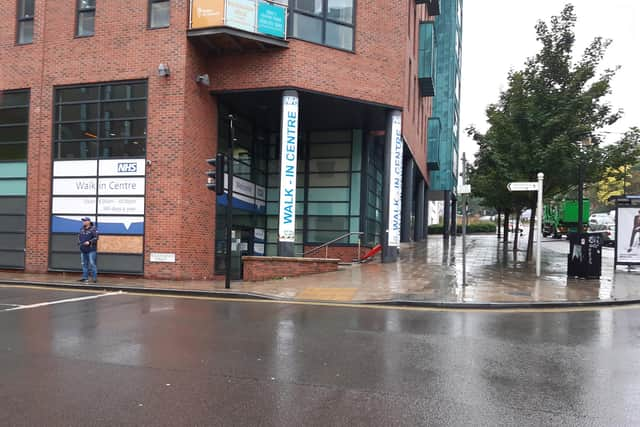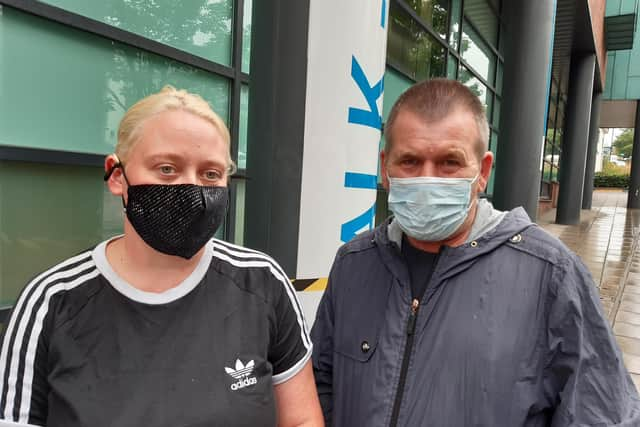Patients call on NHS to sort out problems getting Sheffield GP appointments – and even getting through on the phone
and live on Freeview channel 276
Documents published by Sheffield NHS Clinical Commissioning Group reveal concerns over the problem have emerged in the NHS’ annual patient survey, carried out between January and March.
The Star is aware of recent problems including a patient being offered a phone appointment six weeks after his call, which then never happened, and a patient going without their medication for three weeks as they couldn’t speak to a doctor for a repeat prescription.
Advertisement
Hide AdAdvertisement
Hide AdAlmost 10,000 people completed the survey, and the results are statistically significant at city-wide level.


It states key areas for improvement in the city relate to access – making appointments and getting through on the phone.
It comes as problems with getting in touch with GPs and appointments helped feed a doubling in online feedback to practices.
July 2020 to June 2021 saw 454 pieces of feedback given, compared to 210 in the previous 12 months, the same CCG document reveals.


Advertisement
Hide AdAdvertisement
Hide AdIt does not state the number of complaints but say the main negative theme was access, both through phone and appointments, with the main positive themes staff attitude and efficient organisation of the covid vaccination programme.
The issue has also been raised by the independent organisation Healthwatch Sheffield, which recently published its report of feedback from the public during July.
They stated: “This month we heard about the experiences of 31 people visiting at least 20 different GP practices. Eleven people praised their GP – the most common themes were friendly staff, and professionals who had a good understanding of the individual and offered them personalised care.
“Nine people said that they weren’t able to get an appointment when they needed one because they couldn’t get through on the phone – we heard that patients were in a queue for a long time, sometimes up to an hour, and the line would sometimes drop before they were able to speak to anyone.
Advertisement
Hide AdAdvertisement
Hide Ad“One person said this led to them going without their medication for three weeks as they couldn’t speak to a doctor for a repeat prescription. A number of people this month also reported that they didn’t feel listened to by staff at their GP practice, and didn’t feel supported in seeking treatment.
“We also heard that telephone appointments are not suitable for everyone. One person said they couldn’t access these because of hearing problems; they end up visiting A&E instead to see someone face to face. Someone else told us they couldn’t build a trusted relationship with their GP over the phone, made more difficult because the GP hadn’t introduced themselves. People also reported wanting more choice in having a telephone or face to face appointment.”
Some people made suggestions for how they thought GP services could improve, including providing more resources for clinical staff to handle telephone enquiries. It was noted GP receptionists seem increasingly expected to handle more complex medical situations than they were trained for, for example offering medical advice, discussing test results, or triaging patients.
Sheffield Healthwatch had also received complaints over the lack of GP appointments in June, when it heard about 27 people’s experiences visiting a GP during the month.
Advertisement
Hide AdAdvertisement
Hide AdTen of those were positive, with people saying they managed to get an appointment quickly and praising friendly staff, and two said they liked the telephone appointment system.But they said getting an appointment was harder for some. Of 17 negative experiences they were told about, most people said they found it nearly impossible to get an appointment.
For some, this included when NHS 111 had told them they needed to make a GP appointment urgently. One person told Healthwatch they had to go to the Walk-In Centre instead – they received good care there but said they really needed to see their GP for ongoing treatment.
The Star spoke to patients who had visited the Walk-in Centre on Rockingham Street.
Claire Wright, from Woodhouse, said she had visited the centre after being told to go there by her GP practice.
Advertisement
Hide AdAdvertisement
Hide AdShe said: “When I have rung my GP, I’ve been told either to go here, the walk-in centre, or to A&E. I tried to get an appointment yesterday and was told to go the walk-in centre.”
She added: “There is never anyone on reception at my GPs, and it takes a lot of time for the phone to get answered. Sometimes when it is picked up, it gets put straight down.”
Friend Paul Marriott, also from Woodhouse, said he had been told to go to A&E after he contacted his GP surgery after injuring his toe.
Elizabeth Phiri, from Arbourthorne, said she had tried for two days to get a GP appointment to check out a leg problem
Advertisement
Hide AdAdvertisement
Hide AdShe said: “Yesterday they said they didn’t have any appointments, and were fully booked. I rang today and it was the same. I was told to call at 8am and couldn’t get through. By the time I spoke to someone they were fully booked.”
She added: “They examined me at the walk-in centre and said I had a bruise but were not sure if there was a blood clot, so I should see my GP or go to A&E. But I can’t sit in A&E for four hours as I have a child to pick up from school. I will have to try to get a GP appointment again.”
One retired scientist, from Broomhall, who asked not to be named, said he arrived at the Walk-in centre to be told there was a two hour wait.
He said he had gone there after he had initially been offered a phone call from his GP, six weeks after he had initially tried to make an appointment.
Advertisement
Hide AdAdvertisement
Hide AdHe said he waited all day for the phone call, but it never came.
He added: “To rub salt in it, the surgery then sent me a message to my mobile asking me how I rated the interview. I rang to say there was no contact. They couldn’t offer me an appointment today because my doctor was not in.
“They said they would try to get another doctor to ring, but it’s not rung today.”
He said needed to be referred by a doctor for ongoing endoscopy treatment which he had not now had since the start of the pandemic. He said he now also had a growth on his back that he was concerned about, which he thought needed an examination rather then a phone call.
But some praised the service they had received.
Advertisement
Hide AdAdvertisement
Hide AdMichelle Webster, from Hillsborough, said when her husband had needed to speak to a doctor, he was called back within half an hour.
Another patient, from Darnall, said he had found if he phoned his GP early he was able to get appointments.
“I find I just have to persist,” he said.
In June, Dr Ben Allen, GP Partner at Birley Health Centre, wrote a public ‘apology and explanation’ and posted it on social media, in which he outlined the reasons why GPs were struggling with workloads.
He told the Star: “It is caused by a number of different pressures that have been brewing over decades. The nature of medicine has changed.
Advertisement
Hide AdAdvertisement
Hide Ad“People are living longer and with a greater level of medical complexity than ever before, which we are not used to.
“There is not going to be a sudden crisis; things are slowly getting worse and worse.”
Dr Allen explained while doctors are not to blame for the difficulties patients have with getting to see their GP, he felt by apologising for the situation everybody found themselves in it would help people understand.
The key issue GPs face, Dr Allen said, is the ever-increasing workload coupled with the lack of funding.
Advertisement
Hide AdAdvertisement
Hide Ad“I am not trying to blame anybody, but GPs’ work does need more funding,” he said.
“GPs are given around £150 per year for each patient, and every year the workload increases but any small increase to funding does not nearly keep pace.
“The workload is increasing and so that needs funding to make it doable. At the moment it is not doable. In hospitals, if you do more operations you get more funding.
“But we still have the same contract for around £150 per person but the amount of work we need to do to fulfil that contract gets more challenging every year.”
Advertisement
Hide AdAdvertisement
Hide AdDr Allen also explained that the situation has worsened due to the backlog that has arisen over the course of lockdown, and the sharp rise in demand for GP services now that lockdown has eased.
And the issues raised by the high demand have been compounded by the requirement for GPs to provide the staff to carry out the vaccine rollout.
A Department of Health and Social Care spokesperson said: “The government has worked with the NHS on tackling the backlog caused by the pandemic investing £270 million to expand GP capacity, on top of £1.5 billion committed for general practice until 2023/24 to deliver world-class care to patients.
“We’re hugely grateful to GPs and their teams for their the hard work and dedication, who have brought appointment numbers back to pre-pandemic levels with over 330 million appointments delivered in the last year.”
NHS Sheffield CCG has been contacted for comment.
